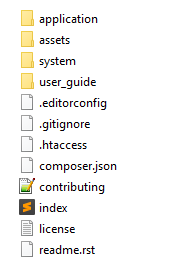Codeigniter
The Codeigniter is an MVC based application development framework. It enables the speed of development because It provides a rich set of libraries. In where write “less” and “do more”.
Why Codeigniter is useful?
- you would like a framework with alittle footprint.
- You need exceptional performance.
- you would like broad compatibility with normal hosting accounts that run a range of PHP versions and configurations.
- you would like a framework that needs nearly zero configuration.
- you would like a framework that doesn't need you to use the program line.
- you would like a framework that doesn't need you to stick to restrictive secret writing rules.
- you're not fascinated by large-scale monolithic libraries like PEAR.
- you are doing not need to be forced to find out a templating language (although a templet program is optionally accessible if you need one).
- You eschew complexity, favoring simple solutions.
- You need clear, thorough documentation.
Codeigniter Installation:
1. Download Codeigniter from Github or It’s official website
A ) Download from Official website: https://codeigniter.com/
B ) Download from github : https://github.com/bcit-ci/CodeIgniter
2. Unzip the .zip package through any extracting software like (winzip, winrar or 7-zip), etc these all of the tools used to extract this.
3. Upload all files and folder of its package into your project root folder, where the project root folder should be located index.php file.
4. After all, files move then goto application/config folder to config your project with the session, base_url and database configuration, etc.
Codeigniter Structure
Codeigniter Goal & Strength
CodeIgniter is an Application Framework
Codeigniter goal is to enable you to develop projects much faster.
CodeIgniter may be a toolkit for those who build internet application exploitation PHP.
Codeigniter provides a rich set of Tool kit & functional libraries for common tasks such as :
1. Benchmarking
2. Caching
3. Calendaring
4. Shopping Cart
5. Configuration
6. Email
7. Encryption
8. File Uploading
9. Form Validation
10. FTP
11. Image Manipulation
12. Inputs
13. JavaScript
14. Language
15. Loader
16. Migrations
17. Output & Buffering
18. Pagination
19. Template Parser
20. Security
21. Session
22. HTML Table
23. Trackback
24. Typography
25. Unit Testing
26. URI
27. User Agent
28. XML-RPC and XML-RPC Server
29. Zip Encoding
These are a list of CodeIgniter functional libraries.
- Codeigniter is Paid or Free - Of course, Codeigniter is free, CodeIgniter is licenced below the mit license thus you'll be able to use it.
- Codeigniter performance - Codeigniter could be a light-weight, superior PHP framework. The core system (Heart of Codeigniter) needs a tiny footprint of libraries. It is in stark distinction to several frameworks that need considerable additional resources. you'll be able to additionally add further libraries as per such requests.
- Note – Codeigniter is far quick compared to different frameworks.
- Codeigniter Uses M-V-C Structure
- CodeIgniter uses the Model-View-Controller approach, which permits a nice separation between logic and presentation. this is often significantly smart for comes within which designers square measure operating together with your example files because the code these files contain are going to be reduced.
- Codeigniter generates Clean SEO friendly URLs
- The URLs generated by CodeIgniter square measure clean and search-engine friendly. instead of mistreatment the quality “query string” approach to URLs that are synonymous with dynamic systems.
- CodeIgniter is additionally extensile
- The Codeigniter system is additionally extensile, It will be simply extended through the employment of your own libraries, helpers, or through category extensions or system hooks.
- Is Codeigniter needs example engine to analyze HTML files
- CodeIgniter will associate with an easy example program which will be optionally used, it doesn't force you to use one. example engines merely cannot match the performance of native PHP, and also the syntax that has got to be learned to use an example engine is sometimes solely marginally easier than learning the fundamentals of PHP.
<ul>
<?php foreach ($addressbook as $name):?>
<li><?=$name?></li>
<?php endforeach; ?>
</ul>
